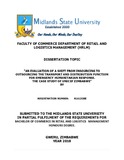Please use this identifier to cite or link to this item:
https://cris.library.msu.ac.zw//handle/11408/3688Full metadata record
| DC Field | Value | Language |
|---|---|---|
| dc.contributor.author | Mukwekwe, Freddie Fungayi | - |
| dc.date.accessioned | 2019-06-17T08:54:55Z | - |
| dc.date.available | 2019-06-17T08:54:55Z | - |
| dc.date.issued | 2018 | - |
| dc.identifier.uri | http://hdl.handle.net/11408/3688 | - |
| dc.description.abstract | The main objective of the study was to evaluate the shifting from insourcing to outsourcing of transport and distribution services in response to humanitarian emergencies at UNICEF, Zimbabwe. The specific objectives of the study were to: identify the drivers of outsourcing, determine the influence of outsourcing on the performance of UNICEF Zimbabwe, evaluate the extent to which transport outsourcing impact on the performance of UNICEF Zimbabwe and establish the influence of transport outsourcing on the performance of UNICEF Zimbabwe. The researcher collected data from key supply chain personnel who include supply chain managers, officers or their equivalent. Primary data was collected using semi structured questionnaire and face to face interviews. The research was both qualitative and quantitative in nature. According to the findings assessments were done to bridge the gap between the organizations’ demand and supply level to a great extent. The study found out that they were in agreement that they outsourced transport. The study found that overall success on the mandate assigned was achieved to a great extent. The study concedes that outsourcing gives the organizations a competitive edge and ensures the efficiency of UNICEF, Zimbabwe. UNICEF opted to outsource distribution and transport service due to the associated advantages and possible influence on organizational performance, thus enabling the organization to focus on their core competencies. The study recommends the creation of office of outsourcing management within UNICEF. From the findings the study recommends that UNICEF need to identify the key areas within the information systems outsourcing that have the highest benefits and least challenges or negative impact on the performance. From the findings the study also recommends that UNICEF should outsource these services by ensuring that information is handled with utmost care by ensuring there are high security measures not to disclose the organizations information. The outsourcing practices being adopted by UNICEF resulted in increased productivity, organizational effectiveness, continuous improvement, improved quality and improved quality of work life and thus outsourcing of these processes was an ideal solution that helped to increase the organization performance. | en_US |
| dc.language.iso | en | en_US |
| dc.publisher | Midlands State University | en_US |
| dc.subject | Insourcing | en_US |
| dc.subject | Outsourcing | en_US |
| dc.subject | Organization performance | en_US |
| dc.title | An evaluation of a shift from insourcing to outsourcing the transport and distribution function for emergency humanitarian response: the case study of UNICEF Zimbabwe | en_US |
| item.fulltext | With Fulltext | - |
| item.grantfulltext | open | - |
| item.languageiso639-1 | en | - |
| Appears in Collections: | Bachelor Of Commerce Honours Degree In Retail and Logistics Management | |
Files in This Item:
| File | Description | Size | Format | |
|---|---|---|---|---|
| Freddie Mukwekwe Final 2018 Dissertation.pdf | Full Text | 1.73 MB | Adobe PDF |  View/Open |
Page view(s)
500
checked on Jan 2, 2026
Download(s)
510
checked on Jan 2, 2026
Google ScholarTM
Check
Items in MSUIR are protected by copyright, with all rights reserved, unless otherwise indicated.



